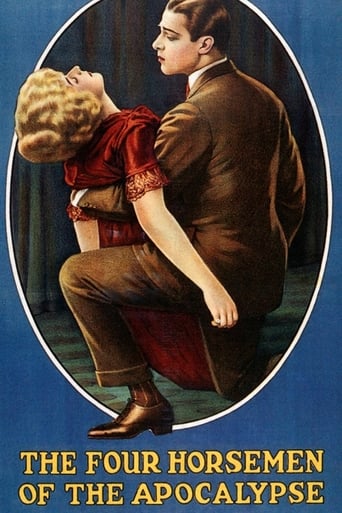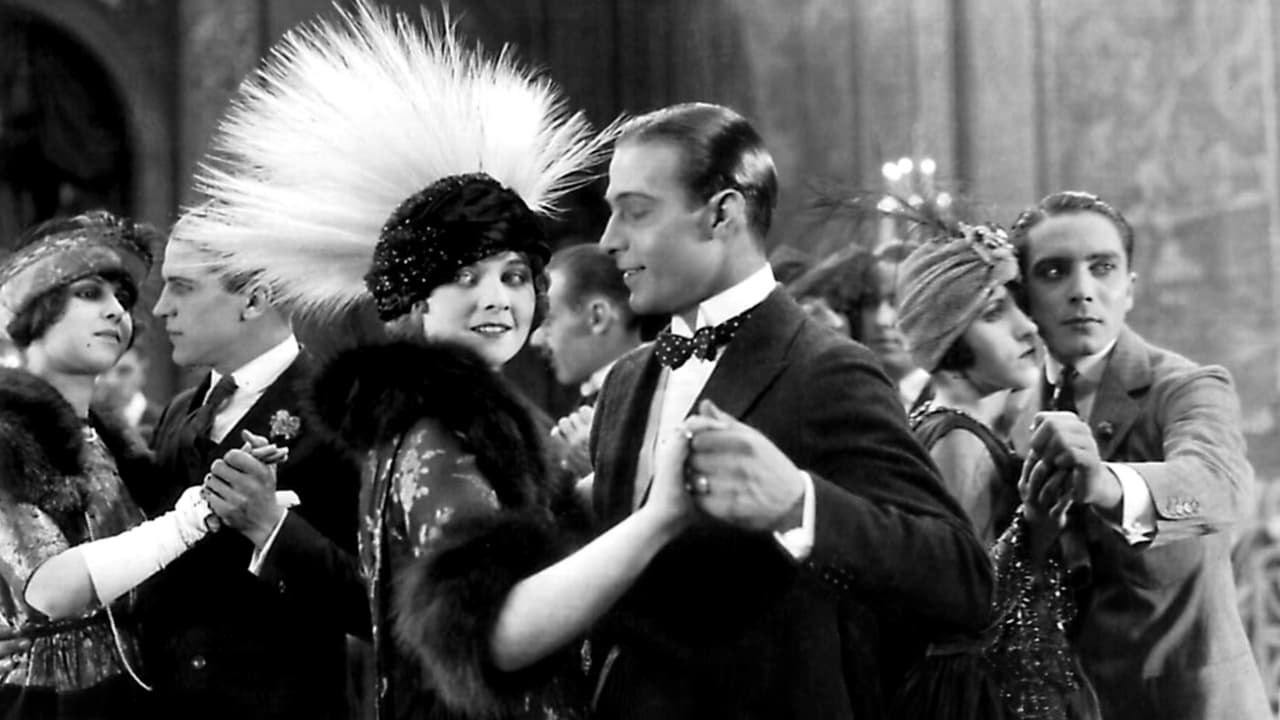SimonJack
This first film rendition of "The Four Horsemen of the Apocalypse" is a fine example of the early movies of substance. It is one of the early and best epic stories made during the silent era. It's worthy of preservation for that and for the style and methods of acting and filmmaking before the advent of the "talkies." This film seems to follow the story in the book closely. It is based on a best-selling novel of the same title by Vicente Ibanez, a Spanish author. But modern audiences are wont to compare this film with the later project of 1962 that starred Glenn Ford and a huge cast of notable actors. While the general story is the same, there are major differences in the screen versions. This film clearly is an anti-war movie. A family is torn apart by divided loyalties in a war, and the result is the death of the sons. Coming as it did just a few years after the end of World War I, it preaches strongly about the horrors of war. The foreboding character of Tchernoff (played by Nigel De Burlier) is a sort of harbinger of events to unfold, a prophet of doom, and a narrator within the story. That was a device that early Hollywood seemed to use on occasion in silent films, especially in longer dramatic films such as this. It would convey more details to the audience about what was taking place, as well as be a tool for persuasion as here. The advent of sound made the device obsolete. Today, it would be a distraction, but in this film it is a significant role. Another major difference between this and the 1962 film is in the main role. In the 1962 movie, Glenn Ford's Julio Desnoyers is the leading character. Not so in this first film. The main character here is Julio's father, Marcelo Desnoyers, played by Josef Swickard. Julio is a major character in this film, but only after that of his father. Rudolph Valentino plays Julio and clearly had his breakout to stardom with this role and film. Vincente Minnelli wanted the 1962 film set during WWI, as was this original and the novel. I doubt if that would have boosted the later film. The outcome would still have been the same – with Julio being killed. And, another problem would have been with the historical perception of World War I. It was the great war of the trenches – where most of the fighting took place and senseless waves of men were killed. But, this story takes place almost entirely in the time before the sides went to the trenches. Only toward the end do we see Julio and his cousin dying facing each other between the trenches. And his father and family lament his death at his grave site.
dwpollar
1st watched 10/20/2013 - 4 out of 10(Dir-Rex Ingram): Heavy handed anti-war movie comes across very one-sided as far as the perspective on a war between Germany and France in this epic family drama, love story & war movie wrapped into one package. Rudolph Valentino plays a son of a Parisian who departed to Argentina fleeing the country from an earlier conflict, but returns after his grand-father's demise. The son has a weakness for the woman-folk and becomes involved with the wife of one of his German cousins causing scandal between the two families. He is an artist who lives off his father's money until he decides to join the cause of the war. The four horsemen come into play as an allegory against the biblical reference(referred to in the movie as an old book) in Revelations where each horsemen represents a different side of the results of war activity and the movie does some special effects introducing these horsemen at different points of the movie. Rudolph's father hordes antiques in an old castle in France, but it's destroyed by the German's in an almost naturally occurring guilty verdict on his original escape from the draft. This is a departure from the rest of the movie's otherwise emotionally pointed view about the negative perspective on war. There is not much detail given to the war only that Germany is the conqueror and France takes the blunt of their blows. I believe the piece would have been stronger if the motivations of both sides would have been revealed better. The romance in the story is lessened and seems to just be an opportunity to show off the good looking Valentino's occasional dancing with the ladies. I'm sure the actual re-percussions of World War I prompted the novel and the movie and this played real well to packed houses in America when it first came out, but doesn't play as well to the current age. Overall, I just didn't see that the movie made it's point very effective -- which appeared to be that war should be avoided. In my opinion it wasn't bold enough in it's assessment.
Boba_Fett1138
The first halve of the movie already makes a great movie on its own, in which it focuses on the more dramatic and romantic aspects. Everything you would expect from a Rudolph Valentino movie. But the movie gets even better halve way trough, starting with the prophecy of the four horseman of the apocalypse, at the dawn of WW I. The movie then becomes such a great and powerful anti-war movie. It's the sort of 'war and peace' approach of the movie that makes it so great as well as effective.In its storytelling and compositions the movie was at least 20 years ahead of its time. At times while watching this movie it's really hard to believe that this movie was made in the very early '20's. It has some amazing powerful striking images, such as the visualization of the actual four horseman of the apocalypse and a couple of sequence toward the ending, which I'm not going to spoil.The movie features some religious themes, but it isn't done in a preachy or distracting way. It's sort of done in the same way as in the "Ben-Hur" movies. It's beautifully weaved into the story, without scaring off the non-religious persons.The movie can be a called an epic because of its story and storytelling but also because of its images. The early battle sequences are all grand and impressive looking (although its obvious that some of it is simply archive footage, from presumable WW I) and so are its settings. It of course helps that the movie is set throughout in different places and continents as well.Despite that this is Rudolph Valentino's first real big movie role and this was the movie that made him a big star, it isn't really a Valentino movie, in the sense of that he is the one and main hero of the movie. The movie throughout focuses on a lot of character and only in the middle part it focuses prominently on Valentino.Truly one of the best and most powerful movies out of the silent era.10/10http://bobafett1138.blogspot.com/
hcoursen
I know that this is a celebrated classic, but it sprawls. Some of the scenes -- Valentino dancing, for example -- are there only for their own sake, and add little to the narrative movement. Many of the long sequences with the greedy Frenchman are just tedious. Like the films of D.W. Griffith, this one is preachy and moralistic. The film finally makes a powerful point -- all the sons of the father who urged them to war,or, in the case of the Frenchman, was delighted to see his son in uniform, die in World War I. The battle sequences -- the epic 'trip to the underworld' -- are interesting for their mix of mud and allegory. Valentino makes the film worth while, and the wonderful Alice Terry, best of the silent screen actresses, makes the film memorable. Had the film tightened around the doomed relationship between Valentino and Terry it would have lost its sweep, but it would have achieved an intensity that the finished product lacks.



 AD
AD




